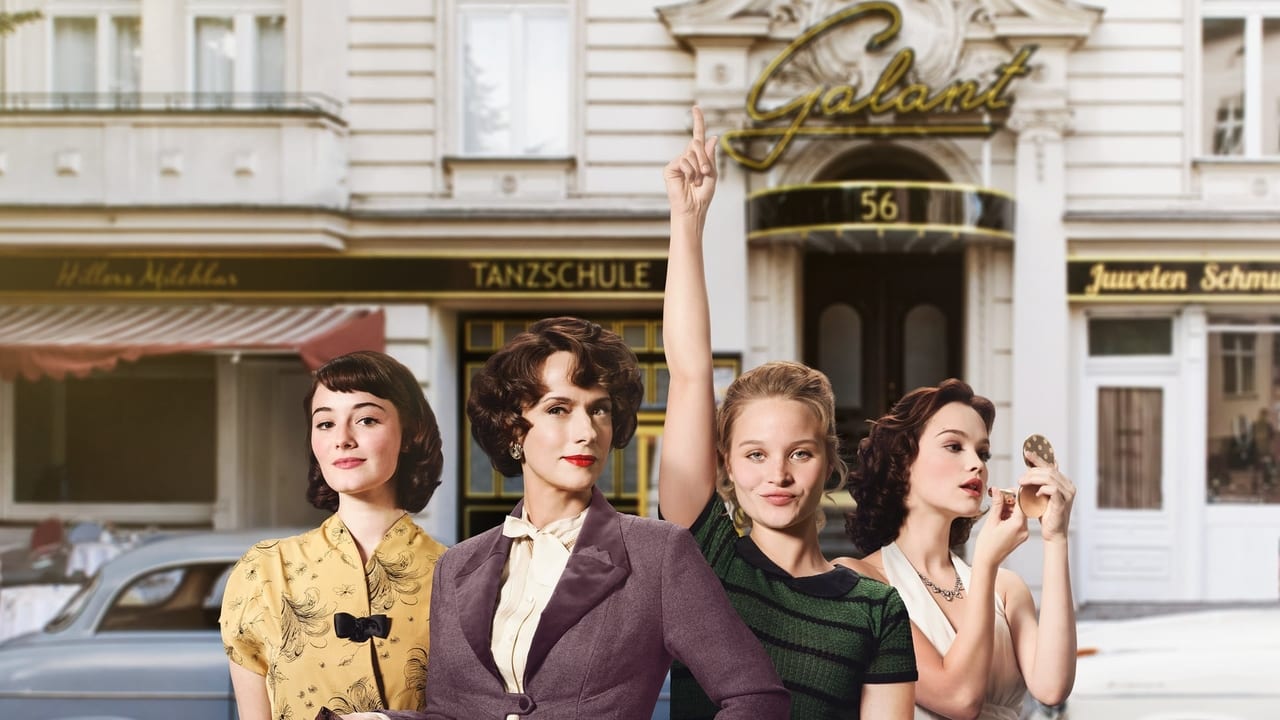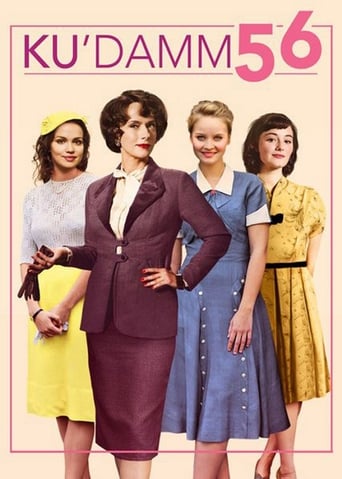Chatverock
Takes itself way too seriously
Sharkflei
Your blood may run cold, but you now find yourself pinioned to the story.
Helllins
It is both painfully honest and laugh-out-loud funny at the same time.
Aiden Melton
The storyline feels a little thin and moth-eaten in parts but this sequel is plenty of fun.
khsooners
Ku'damm 56 is fun to watch. This is a great achievement by the actors and the set designers. The series is a bit loaded too much with historical input, almost like something made by a history teacher (and I say this as a history teacher).
Sometimes the characters and situations are too much "an example for this" and an "example for that". It is still really interesting how much the 50s were a completely different age even though you can see cars, television and Rock 'n' Roll.
The actresses of the three daughters are very good as are the mother and Heino Ferch's sinister doctor.
So while this is no Downton Abbey or Boardwalk Empire in terms of quality, it is well worth watching.
simon-hansen
Must see piece to understand German post war history.
Jules Voigt
I started watching this show since it showed up on Netflix, and German TV miniseries tend to have good quality. However, the show is wrongly advertised in my opinion.First of, I am German, I study humanities and German post-war history is one of my favorite topics. We meet a mother of three daughters who is running a dancing school on the infamous Kuhfürstendamm. The setting is great, the costume and make-up department worked hard! I won't go into the detail when it comes to history, and instead focus more on the characters, which is important. Especially when it comes to Monika and something unaware viewers should be aware of.The writers decided to make her a trope, which is all good as we have thousands of male tropes running around in TV-land. I liked her character and could associate with her for a while. Now, I felt sorry, because whomever wrote her character seems to have no idea. First, they had her be sexually assaulted by the man her mother wants her to marry. I am aware that this happens, sadly enough, but is it a woman's only character development and if so, why? I am personally tired of this as a plot point. The other absurd part of this storyline is that she connects with her rapist. They try to give him some sort of redeeming qualities and that is, considering how, in contrast to this, horrible they treat the only gay character in this series, a joke.
Above mentioned gay character marries Helga, one of the three daughters. He is portrayed, as we often see it in such shows, as the reason for her sadness. Imagine being a privileged white woman married to gay man. How horrible must your life be. What a tragic story, it is even more tragic than Hamlet! Now, this aside, I wished they would have taken her character and developed it to a point where women can actually associate themselves with her. Because she lacks depth and interesting characteristics. To have her life solely based on the fact that he is gay is basic. I understand that being an unmarried woman back then was hard, but instead: what if she supported her husband? What, if they went for a more feminist plot for the two of them? They was such an amount of wasted potential, it hurt!Eva has a crush on an older man, who electroshocks her sister's husband, is an overall horrible man, and she falls in love with a married football player from Eastern Germany. All good and well except:
If you sell this series as a series that is supposed to attract a mostly female audience, with "empowering female characters", you actually have to know how to write women: as people. These women are tropes, and it pains me so much because there was so much potential. Eva is in her own way likable, with a typical crush, and the want to climb as high as her mother. I liked her character a lot, but again: wasted potential.The men? I understand the intention to say "men are the evil here" and the majority of them are for good reasons. As the rapist, who they, as aforementioned, try to shove into our arms so that we feel some sort of empathy for him? No way, thank you.
Freddy is likable and has many things in common with my father. I also enjoyed the actor and his portrayal.
Wolfgang, the gay man, whom you feel for the most? Portrayed as an abusive pig. Now, being gay, I don't think the writers ever met a gay man in their lives or have no idea about what gay people endured in that period and still endure to this day.
The father? Now, they do not seem to have any inclination to put some effort into the Eastern German area. About her mother: the character is hard to watch because she is the embodiment of Western German women who were involved with the Nazis and the acting was well done. She gave me the good kind if headache. My favorite character is Monika, and partly Freddy - her lover -, even though she has to go through so much crap by the writers that I feel like I want to write this character the book she deserves.So, next time you try to write an "empowering show for women", perhaps you should consider making this better. Consider more research, and add more depth to characters who could have been worth it. This show was a great concept, but I have become so angry by watching it that I needed to smoke three cigarettes and that is bad for my health.Ergo:
Good watch if you are bored and/or want to learn some outdated German words for any project, have a glance into Western German history (not the Eastern, since they spent little to no effort in that part... seriously), go for it. But do not expect too much, and you will cringe many times as well at the scenes between Monika and her rapist.I give it a six. Now, I need to get rid of my headache.
dromasca
Looking back in historical perspective 1956 was one of these turning point years in history, when things accelerate, when a lot of related and unrelated events with lasting consequences happen. It was the first such year after WWII, the year of the Khrushchev report that started the de-stalinization process in the Soviet Union, the year of the Hungarian anti-communist revolt in Hungary crushed by the same Soviet Union, the year of the Suez war. While less spectacular things happened in occupied Berlin and Germany, 1956 was a typical year in the middle of the decade that saw Germany recovering from an economic point, while part of its population tried to put the past behind them. Forgetting the past would not work, we know it know, and Germany really recovered only after assuming its past morally and historically, but this was a process that last many years. 1956 was somehow in the middle, and the transition to peace and prosperity was felt and lived differently by different categories of people, by those who were to young to remember, by those who wanted the past forgotten, and by those who could not forget - the survivors of the camps, the former prisoners. Add to all these the occupation and division of Germany and of the city of Berlin (not completed at that time, the Berlin wall was built only in 1961) and the clash of cultures initiated by the beat and rock generation which took specific aspects in Germany. It was a complex landscape, which forms the background for the TV mini-series Ku'damm 56 which was screened on the French version of ARTE TV as 'Berlin 56'.The Kurfürstendamm or Ku'damm as Berliners and especially visitors call it, the main commercial street of West Berlin, hosts in the movie the school of dance of Caterina Schöllack (Claudia Michelsen) whose husband did not return from the war, leaving her with the task of raising her three daughters. From many respects she is a symbol of the old Germany, doing her best to survive and adapt, to forget the past and build the future of her daughters the way she believes is best - marrying them well as good German wives into rich families, or at least with solid honorable husbands. This seems to work with the two elder daughters, but not with Monika, the younger one (Sonja Gerhardt) who is different from her sisters from all points of view - a mix of rebel and non-adapted character, with one big passion - dancing. She actually has inherited this skill from her mother, but the tastes are different in a world where jazz and 'decadent' rock'n'roll become in Germany as all over the world a symbol of generations clash. The story describes well the evolution of the four women, their relationships, their rebellion and compromises on the social and political background of a country where ruins were not completely cleaned up and wounds of the recent past were still bleeding for many.Quite different, and actually the opposite of the situation in many scripts of the big or TV screens, while the four women profiles are well built and developed, some of the men characters are reduced to stereotypes. When they are not schematic their evolution is problematic - like the character of Joachim Franck and the troubled relationship to Monika, which starts with a rape to become almost a failed love story. It also seemed to me that the East Berlin scenes lacked a more serious perspective of the differences between the two parts of the Germany. There is a lot of dance and music and the differences in style between the different genres occupy an important role in the series, these could be the subject of another film, or maybe of the continuation of the series, as 1956 is also the point in history when Berlin starts recovering its between-wars shining as a multi-cultural center. As the ending shows Monika walking a Ku'dam that looks like a Dorothy from Oz path to new horizons, the continuation of the series may be in preparation. I am looking forward to it.

